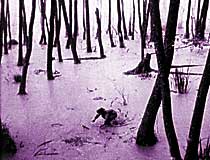When Andrei Tarkovsky died in 1986, shortly
after finishing his post-apocalyptic fantasy "The Sacrifice,"
he left behind a sturdy body of work that encompassed just seven
feature films over a quarter-century.
Aficionados of the director included Ingmar Bergman, who himself
towers over all other filmmakers of the past half-century, and
who once said that Tarkovsky was "the greatest." Since
Tarkovsky’s films are so rarely screened, most people haven’t
been able to take a look for themselves. But, thanks to Ocularis
at the Galapagos Art Space – whose Sunday film series includes
two showings of Tarkovsky’s debut feature, 1962’s "My Name
Is Ivan," on Oct. 7 at 7 pm and 9:30 pm – Brooklyn film
lovers will get the chance to see for themselves just what to
make of this intensely personal, profoundly Russian artist.
Many of our best movie directors began with a splash, then found
it difficult to sustain the energy of their initial triumph:
Orson Welles and "Citizen Kane" spring immediately
to mind. But Tarkovsky, who started out as many do – with a somewhat
autobiographical story – right from the beginning was able to
plant the seeds of a more complex, even occasionally opaque style,
that served him well for the next 25 years.
The Ivan of the movie’s title is a young boy, no more than 12
years old, who has been orphaned by the harshness and unrelenting
grimness of World War II. Throughout a taut and tense 90 minutes,
Ivan’s childhood is shown to be one of juxtaposition: here’s
an immature kid who can act as a ruthless spy when called upon.
Tarkovsky’s use of stark black-and-white and several dream sequences
and flashbacks create more contrasts: between the bleak, drained
light and dark, and between the everyday reality of survival
and the innocence of happier times. For a first feature, "My
Name Is Ivan" is masterly, from Tarkovsky’s evocative choice
of music and his precise editing to the extraordinarily moving
performance he coaxes out of the brilliant young actor, Kolya
Burlayev.
"My Name Is Ivan," of course, ends tragically, and
the final frames of Ivan’s exhilaration are mercilessly cut short
by the director. But throughout his career, Tarkovsky never flinched
when confronted with showing mankind in all its flawed horribleness,
as his six other features demonstrate. His very next film, the
epic biography "Andrei Rubelev" (1966), was censored
by the Soviets because it dared to present a multi-layered portrait
of the great medieval Russian painter rather than the one-note
political propaganda picture the authorities wanted.
His penultimate film, "Nostalghia" (1983), was an exploration
of an expatriate’s soul – like Tarkovsky himself (who left Russia
in the early 1980s after realizing he would never be allowed
the artistic freedom he craved) – the movie’s protagonist lived
outside Russia but yearned for the home to which he could never
return.
Tarkovsky’s final film, "The Sacrifice" (1986), may
have ended up preachy and often stultifyingly slow – it shows
us the end of the world through the eyes of a family that’s already
been mentally traumatized by simply living together – yet it’s
filled with images of shattering beauty and rapturous spiritual
affirmation.
If Tarkovsky doesn’t become popular outside of narrow film circles
through such majestic works as "My Name Is Ivan" and
"Andrei Rubelev," perhaps his name will be made more
recognizable through the announced remake of his towering sci-fi
epic "Solaris" (1971). That crass populist director
James ("Titanic") Cameron is supposedly giving it a
go, but remaking "Solaris" is a folly along the lines
of remaking "2001": they are singular films of ideas,
of thought and sophistication and, yes, genius, not just gadget-laden
space operas, which is Cameron’s usual modus operandi.
"My Name Is Ivan," at least, will never be remade;
as most great films do, it speaks a language unto itself, but
it does so with a clarity that viewers of any stripe will understand.
"My Name Is Ivan" will be
screened on Oct. 7 at 7 pm and 9:30 pm at Galapagos Art and Performance
Space, 70 North Sixth St. in Williamsburg. Admission is $6. For
more information, visit www.ocularis.net on the Web or call (718)
388-8713.

























